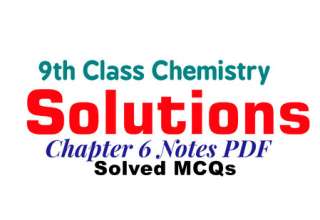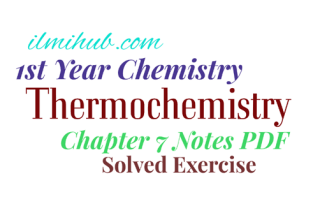In this post”FSC 1st Year Chemistry Chapter 11 Long Questions” I am sharing PDF Notes for the students of FSC Part 1. The Name of this Chemistry Chapter 10 is Reaction Kinetics . So the students can download Reaction Kinetics Chapter Long Questions notes in PDF format from here. This file contains 31 pages. These Chemistry Notes are for all the boards working under Punjab Board like Gujranwala Board, Lahore Board, Faisalabad Board, Multan Board, Rawalpindi Board, Sargodha Board, DG Kahn Board, and Sahiwal Board. Here are complete 1st Year Chemistry Notes.
11th Class Chemistry Chapter 11 “Reaction Kinetics” Long Questions Download PDF
REACTION KINETICS
“The branch of chemistry which deals with the study of rates of chemical reactions and the factors that affecting the rate of chemical reactbions is called as reaction kinetics.”
TYPE OF CHEMICAL REACTIONS;
Chemical reaction can be divided into following type according to rate of chemical reactions
- Extreme fast chemical reaction; “The chemical reaction which take place rapidly and seems to occur instantaneously are called as extremely fast reaction.”
Example; neutralization of a strong acid with a base
- Moderately fast reactions; “the chemical reactions which take place at a moderate rate are called as moderately fast reaction.”
Example:hydrolysis of an ester
- Very slow reactions: “the chemical reactions which can take place at a very slow rate and take much longer time for their completion are called as very slow reactions.”
Example; the rusting of iron,
The fermentation of sugar.
RATE OF REACTION:
“The rate of reaction is defined as the change in concentration of a reactant or a product divided by the time taken for the change.”
Mathematically;
| Rate of reaction | = | Change in concentration of the substance ___________________________________________ Time taken for the change |
UNIT: The unit of rate of reaction for the liquid is moles.dm3.sec-1 and the unit of rate of reaction for the gas is atm.sec-1
Order of reaction:
“The order of reaction is equal to the sum of all the exponents to which the concentrations are raised in the equation of a chemical reaction.”
Or
“The order of reaction may also be defined as the number of reacting molecules, whose concentrations alter as a result of the chemical reaction.”
Zero order reactions;
“A reaction is said to be zero order if it is entirely independent of the concentration of reactant molecules.”
Mathematically;
A ____________ Products
R = k [A]o since [A] 0, it is equal to 1
R = k
First order reaction;
“The reaction in which the rate of reaction depends upon the concentration of a single reactant raised to power one are called first order reaction.”
Mathematically; A Products
R = k [A] 1 since [A] 1, it is equal to 1
R = k [A]
Second order reaction;
“The reactions in which the rate of a reaction depends upon the concentration of a single reactant raised to power two or two reactant raised to power one, are called as second order reactions
Mathematically; 2A Products
R = k [A] 2
OR
A+B Products
R = k [A][B]
Relevant Notes
- 11th Chemistry Chapter 1 Long Questions Notes PDF
- 1st Year Chapter 2 Long Questions Notes PDF
- 11th Chemistry Chapter 3 Long Questions Notes PDF
- 1st Year Chemistry Chapter 4 Long Questions Notes
- 11th Chemistry Chapter 5 Long Questions Notes PDF
- FSC 1st Year Chemistry Chapter 6 Long Questions Notes PDF
- FSC 1st Year Chemistry Chapter 7 Long Questions Notes PDF
- 11th Chemistry Chapter 8 Long Questions Notes PDF
- 1st Year Chemistry Chapter 9 Long Questions Notes
- 11th Class Chemistry Chapter 10 Long Question Notes





